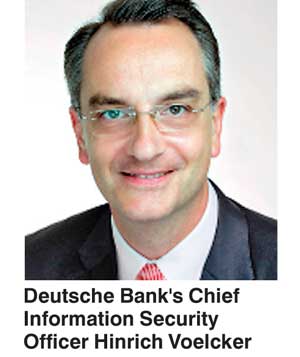Tuesday Feb 24, 2026
Tuesday Feb 24, 2026
Wednesday, 14 September 2016 00:03 - - {{hitsCtrl.values.hits}}
 FRANKFURT (Reuters): Deutsche Bank is calling for a reform of SWIFT, the global financial messaging system which has faced criticism since February’s $81 million heist at Bangladesh Bank.
FRANKFURT (Reuters): Deutsche Bank is calling for a reform of SWIFT, the global financial messaging system which has faced criticism since February’s $81 million heist at Bangladesh Bank.
Germany’s flagship lender – whichthe International Monetary Fund has branded as the world’s systemically most risky bank for its numerous links to other lenders – isone of the biggest users of SWIFT. It is one of the first large banks to publicly urge changes.
SWIFT is only as strong as its weakest member, Deutsche Bank’s Chief Information Security Officer Hinrich Voelcker said, adding the bank was in discussions with SWIFT about the consequences of the Bangladesh heist.
“If trust in this system breaks down we all have a problem,” he said, without saying which specific reforms he believes are needed.
SWIFT is a member-owned cooperative, dominated by large Western banks, including lenders such as Citi, JP Morgan and BNP Paribas, which built the network decades ago.
It now connects more than 10,000 different financial firms and industry experts have said all of its users should have to meet a minimum security standard to continue accessing it.
Since the 1990s, many smaller banks in emerging markets have joined SWIFT, which stands for Society of Worldwide Interbank Financial Telecommunication.
Current and former board members of SWIFT have told Reuters that for years the organisation suspected there were weaknesses in the way smaller banks used its messaging terminals.
In the Bangladesh heist, hackers broke into a computer interface called Alliance Access, a piece of software sold by SWIFT for accessing its central network. It is still unclear exactly how the thieves gained entry.
Bank Bangladesh, the country’s central bank, has alleged a botched upgrade of its system left vulnerabilities in it. SWIFT has rejected any responsibility for the way Bangladesh Bank upgraded its systems.
Since the Bangladesh incident many banks have added security features, Deutsche Bank’s Voelcker said, adding rapid alert systems helped banks exchange information on hack attempts and patterns.
LONDON (Reuters): Global economic growth will be so slow over the next 35 years that policymakers will struggle to meet the significant economic, social and political challenges that results, Deutsche Bank said on Friday.
And unlike the past 35 years, inflation and bond yields will rise over the next three decades, said the report, which was cited by bond traders on Friday as a reason for a selloff in fixed income markets that pushed bond yields up to levels not seen for months. Stock markets around the world also fell.
The detailed annual study from one of the world’s biggest banks argued that all the conditions underlying the previous 35 years of rising global growth and prosperity are fading.
“We’re about to see a reshaping of the world order that has dictated economics, politics, policy and asset prices from around 1980 to the present day,” Deutsche’s report said.
“Given that this current cycle has lasted around 35 years, it’s possible that the next cycle ... will also last many decades. Extrapolation of the last 35 years could be the most dangerous mistake made by investors, politicians and central bankers,” it said. It said asset valuations in major developed countries have never been higher, for reasons unique to the 1980-present day period. The 10-year U.S. Treasury yield, effectively the global benchmark interest rate, leapt to 1.67%, its highest since Britain voted on June 23 to leave the European Union.
Germany’s 10-year yield rose sharply too, popping above zero for the first time since the Brexit vote. Wall Street slid more than 1%, also the biggest decline since June.
According to Deutsche, common themes over the next 35 years will include: lower real growth, higher inflation, less international trade, more controlled migration, lower corporate profits as a share of gross domestic product and negative real returns in bonds.